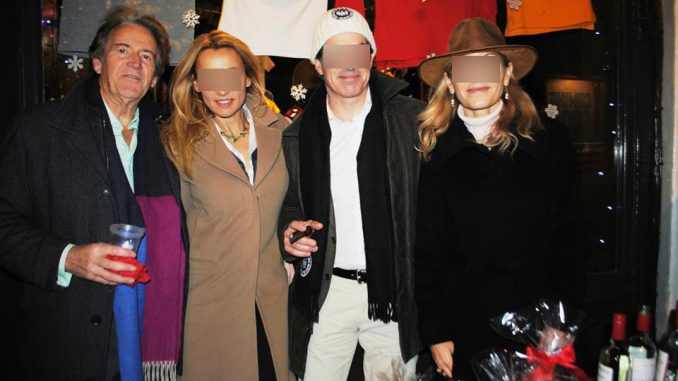
A New Zealand-born British businessman who helped criminals steal nearly $140 million in one of Europe’s biggest ever fraud cases at the time has had his defamation win against author Ian Wishart thrown out by the Court of Appeal, and a retrial ordered.
The 20 page judgment issued this morning sets a major legal precedent on the power of judges to overturn jury verdicts.
Lindsay Smallbone sued his ex-wife Paulette London, along with authors George London and Wishart, over a book called The Hunt written in 2011, which made headlines around the world because it solved a 30 year old international kidnapping mystery involving Ms London’s children.
PHOTO: Lindsay Smallbone at left, at a polo function. None of the other people in the photo are relevant to the court case
A few pages in the book dealt with Ms London’s first marriage to Mr Smallbone, and he sued claiming the book portrayed him as being “of weak character and immoral, and that he is a loathsome and shady person”, noted the Court of Appeal judgment before adding, “To these allegations the defendants pleaded, inter alia, truth and fair comment.”
The defendants lost at a jury trial in Wellington in 2013 in a case that essentially came down to a credibility contest between the urbane upper-class British businessman and a provincial New Zealand housewife.
After the trial, however, another woman who knew Mr Smallbone in England came forward, and the defendants applied to have the jury verdict thrown out and a new trial ordered.
“She and Ms London have never met,” says the Court of Appeal judgment, but “Witness Z gave a materially similar account of Mr Smallbone’s behaviour. Mr Wishart, who obtained her evidence and was first to apply, on 26 September 2013, contended that the evidence was fresh and cogent. He argued that in a ‘he said, she said’ contest the evidence of another woman who claimed to have been treated the same way, albeit years apart, could have made all the difference.”
The judge in the original High Court trial agreed, throwing out the jury’s verdict of “guilty” and $270,000 damages award, and ordering a complete retrial of the case taking into account the new evidence.
Mr Smallbone’s lawyers appealed, arguing the High Court had no powers to order a retrial and that Witness Z’s evidence would not have made a difference.
The Court of Appeal today disagreed strongly with Mr Smallbone, ruling “the trial Court has a wide jurisdiction to act otherwise than in obedience to the jury’s verdict…[perhaps] where the verdict was defective, or was founded on evidence that had been wrongly admitted, or was affected by some important error of law, or might have been different had new evidence been admitted. In any of these latter cases the trial judge might be satisfied that to enter judgement on the verdict would be contrary to the interests of justice and that a retrial was necessary.”
On the issue of cogency, or whether Witness Z’s experience could have changed the minds of the jury, the Court of Appeal said “As to cogency, we agree that Witness Z’s evidence was relevant because it lent credibility to Ms London’s account of Mr Smallbone’s behaviour during their marriage. It pointed to a tendency or propensity to behave in the manner alleged by Ms London.
“Mr McKnight’s [Mr Smallbone’s counsel] main submission was that evidence of this kind is by its very nature insufficiently cogent to change the result.
“That is certainly not the experience of judges, who are familiar with the criminal jurisdiction in which propensity evidence is usually led. In a she-said, he-said case, where the only two eyewitnesses to an encounter give conflicting evidence about what passed between them, evidence of a third person that establishes a relevant propensity is unquestionably capable of satisfying the jury,” ruled the Court of Appeal.
Mr Smallbone’s appeal on all points was thrown out, and he was ordered to pay costs.
Lindsay Smallbone, at one time a New Zealand diplomat, was a key player in the Trustor fraud case, where he helped a group of criminals defraud a public company of which he was Chief Executive of around NZ$140 million in 1997 – much of the money flowing through tax haven bank accounts controlled by Lindsay Smallbone.
In an unrelated scandal, one of Mr Smallbone’s main business partners Bhadresh Gohil was jailed in Britain for his part in a massive $37 million fraud, and newspaper reports in England have linked Mr Smallbone to the selling of weapons into African countries.
The English courts have labelled Lindsay Smallbone as “dishonest”.







